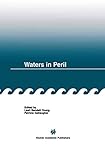Waters in peril [Libro electrónico] / edited by Leah Bendell-Young, Patricia Gallaugher
Bendell-Young, Leah [editor] | Gallaugher, Patricia [editor/a].
Tipo de material: Libro
en línea Editor: Norwell, Massachusetts, United States: Kluwer Academic Publishers, c2001Descripción: xxiv, 248 páginas : ilustraciones mapas ; 25 centímetros.ISBN: 0792375041; 9781461355816 (Print); 9781461514930 (Online).Tema(s): Marine ecology | Endangered ecosystemsNota de acceso: Disponible para usuarios de ECOSUR con su clave de acceso Nota de bibliografía: Incluye bibliografía e índice: páginas 233-248 Número de sistema: 55304Contenidos:Mostrar
Resumen:
Libro
en línea Editor: Norwell, Massachusetts, United States: Kluwer Academic Publishers, c2001Descripción: xxiv, 248 páginas : ilustraciones mapas ; 25 centímetros.ISBN: 0792375041; 9781461355816 (Print); 9781461514930 (Online).Tema(s): Marine ecology | Endangered ecosystemsNota de acceso: Disponible para usuarios de ECOSUR con su clave de acceso Nota de bibliografía: Incluye bibliografía e índice: páginas 233-248 Número de sistema: 55304Contenidos:Mostrar
Resumen:| Tipo de ítem | Biblioteca actual | Colección | Signatura | Estado | Fecha de vencimiento | Código de barras |
|---|---|---|---|---|---|---|
| Libros | Biblioteca Electrónica Recursos en línea (RE) | Acervo General | Recurso digital | ECO400553043425 |
Incluye bibliografía e índice: páginas 233-248
Part I- Biodiversity.. Chapter 1: Biological invasions of marine ecosystems: patterns, effects, and management.. Chapter 2: Known and unknown biodiversity, risk of extinction and conservation strategy in the sea.. Chapter 3: Deep-sea fisheries: perspectives and lessons.. Chapter 4: Fishing down marine food webs: an update.. Chapter 5: Ecological implications of the shellfishery; -- a case study on the west coast of British Columbia, Canada.. Part II - Marine ecosystem function.. Chapter 6: The oceanic nitrogen cycle: a double-edged agent of environmental change?.. Chapter 7: Beyond algal blooms, oxygen deficits and fish kills: chronic, long-term impacts of nutrient pollution on aquatic ecosystems.. Chapter 8: Responses of pelagic marine ecosystems to climate change - can we predict them?.. Chapter 9: The arctic ocean and contaminants: pathways that lead to us.. Chapter 10: Shouldn't we be putting our sulphide-rich mine tailings in the ocean or in lakes rather than on land?.. Part III - Towards solutions.. Chapter 11: The cumulative effects of climate warming and other human stresses on canadian freshwaters in the new millennium.. Chapter 12: Marine biological diversity: conserving life in the neglected ninety-nine percent.. Chapter 13: Human ecology, material consumption, and the sea: indices of human ecological dysfunction.. Chapter 14: Prevention is better than cure: systems of 'no-take' marine reserves.. Index
Disponible para usuarios de ECOSUR con su clave de acceso
Who Speaks for the Oceans? The question has been asked a lot in recent years - just who is looking out for our oceans? Covering over seventy percent of the earth's surface it is the world's largest common property resource,jojntly owned by over six billion humans. It is the foundation for life on earth as we know it. Over the years, many people have spoken about various aspects of our ocean environments and they have spoken to different audiences in many different ways. For many in the public realm, Jacques Cousteau spoke for the ocean. Since his passing, no single voice with the sallle public identity or recognition has emerged. Certainly the many governments bordering our oceans cannot agree on common principles or issues of ocean use and management. We might be tempted think that we do not have an ocean spokesperson or champion, but we would be wrong. Today, the rapidly growing number of scientists working hard to expand our under standing of our ocean realm are the ocean voices we should listen to. At the same time as our scientists advance their understanding of the oceans, we all need to advance our abilities and commitment to communicate on behalf of the oceans with broader and broader audiences who need to be aware of where things stand. Often called "the last great frontier", earth's oceans are vast, widely varied, and are hard to get to, arid into, to do the research we need done. eng
Disponible en línea
Disponible en formato PDF
Subscripción a ELSEVIER 26 de diciembre del 2013
